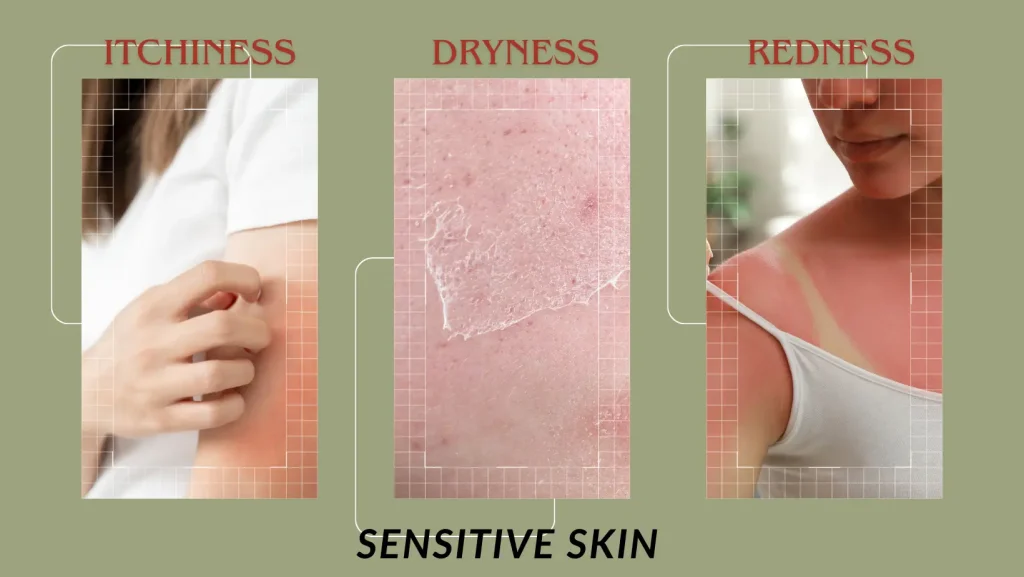What Causes Sensitive Skin? How to Restore and Strengthen Your Skin Barrier
Do you often experience tightness, redness, itchiness, or frequent breakouts despite your best efforts to care for your skin? If so, you might be dealing with sensitive skin. Many people struggle with this condition without fully understanding why it happens or how to manage it effectively.
The answer often lies in something called the skin barrier. When this natural shield is strong, your skin remains hydrated, smooth, and resilient. But when it becomes weak, the skin easily turns sensitive and reactive.
What is Sensitive Skin?
Sensitive skin refers to a skin condition that reacts more strongly than normal skin to external factors such as sunlight, pollution, cosmetics, or even minor temperature changes. Common signs include redness, burning, itching, peeling, or small bumps.

Types of Sensitive or Reactive Skin
- Genetic sensitivity: Some people are born with naturally delicate skin due to genetic conditions (e.g., atopic dermatitis)
- Environmentally induced reactions: Triggered by pollution, UV rays, harsh skincare, or weather changes.
- Temporary sensitivity: Often occurs after cosmetic treatments, laser procedures, or the use of overly strong skincare products.
How Does the Skin Barrier Work?
The skin barrier, also known as the stratum corneum, acts like a wall made of “bricks and mortar.”
- Bricks: Skin cells stacked together.
- Mortar: Essential lipids like ceramides, fatty acids, and cholesterol.
When this barrier is strong, your skin stays hydrated and resilient. If it’s damaged, the skin becomes fragile and prone to irritation.
What Causes Easily Irritated Skin?
Main Factors
- Harsh Skincare Products: Items with fragrance, alcohol, or strong acids can disrupt the barrier.
- Over-cleansing: Washing too often strips away natural oils.
- Pollution and Sun Exposure: UV rays weaken collagen and barrier function.
- Lifestyle Habits:
- Lack of sleep
- High stress (cortisol increases inflammation)
- Poor diet high in sugar and fat
Internal Factors
- Hormonal Changes: Menstrual cycle, menopause, or puberty can increase skin sensitivity.
- Medications: Long-term use of steroids or certain drugs can weaken skin structure.
- Nutrient Deficiency: Lack of omega-3, vitamin D, or zinc can make the skin more prone to inflammation.
Warning Signs of Delicate Skin
Flakiness or discomfort under sunlight
- Tightness or dryness after cleansing
- Redness, burning, or itching after using products
- Frequent breakouts or rashes
- Peeling or flakiness under the sun
- Slow recovery after irritation
How to Restore Sensitive Skin
1. Choose Skincare That Strengthens the Skin Barrier
- Ceramides: Replenish essential lipids.
- Hyaluronic Acid: Provides deep hydration.
- Niacinamide: Reduces inflammation and strengthens the barrier.
- Barrier Creams: Seal in moisture and prevent water loss.
2. How to Read Labels for Sensitive Skin
- Look for “Fragrance-Free” and “Alcohol-Free”.
- Terms like “Hypoallergenic” and “Dermatologically Tested” are more reliable.
- Choose cleansers with pH around 5.5.
3. Ingredients to Avoid
- Alcohol
- Fragrance
- SLS (Sodium Lauryl Sulfate)
- High concentrations of AHA/BHA
4. Lifestyle Adjustments
- Cleanse no more than twice a day with a gentle formula
- Use lukewarm water instead of hot water
- Use soft microfiber towels instead of rough cloths
- Sleep at least 7–8 hours and drink enough water
- Manage stress with yoga, meditation, or light exercise
5. Professional Treatments
- Meso Therapy: Delivers vitamins and nutrients directly to the skin
- Skin Booster: Hyaluronic acid injections for deep hydration
- Laser Treatments: Stimulate collagen and repair the barrier
👉 “For those with delicate skin, professional facial treatments can help restore balance and strengthen the skin barrier.”
What Products Are Best for Sensitive Skin?
The golden rule is to keep it gentle, soothing, and barrier-friendly.
- Moisturizers with ceramides, niacinamide, and hyaluronic acid
- Cleansers with a mild formula and pH ~5.5
- Physical sunscreens (mineral-based) containing zinc oxide or titanium dioxide
How to Prevent Sensitive Skin from Coming Back
- Avoid changing skincare routines too often
- Stay away from irritants like fragrance, alcohol, and harsh exfoliants
- Eat anti-inflammatory foods such as salmon, avocado, nuts, and leafy greens
- Drink at least 2 liters of water daily
- Protect your skin from the sun and pollution
Conclusion: Long-Term Sensitive Skin Care
Sensitive skin doesn’t have to be a lifelong struggle. By identifying the causes and adjusting your skincare, diet, and lifestyle, you can restore your skin barrier and keep your complexion strong and healthy.
If your sensitive skin is persistent and doesn’t improve with home care, it’s best to consult a dermatologist or aesthetic clinic for professional treatments tailored to your skin’s needs.
FAQ
Q: What causes sensitive skin?
A: Sensitive skin is usually caused by a weakened skin barrier, along with triggers like harsh skincare, UV exposure, hormonal changes, and lifestyle factors.
Q: What products are best for sensitive skin?
A: Choose products with ceramides, hyaluronic acid, and niacinamide. Avoid fragrance, alcohol, and harsh acids.
Q: What is the skin barrier and why is it important?
A: The skin barrier is the outermost layer of the skin that locks in hydration and protects against external irritants. When it’s weak, the skin becomes sensitive and reactive.
“Struggling with sensitive skin that won’t improve? Book a free consultation with our specialists at La Grace Clinic to discover treatments tailored to your skin’s unique needs. Restore balance and confidence in your skin today.”
“Strengthened skin not only feels better but also responds more positively to advanced tightening treatments like Ulthera “







